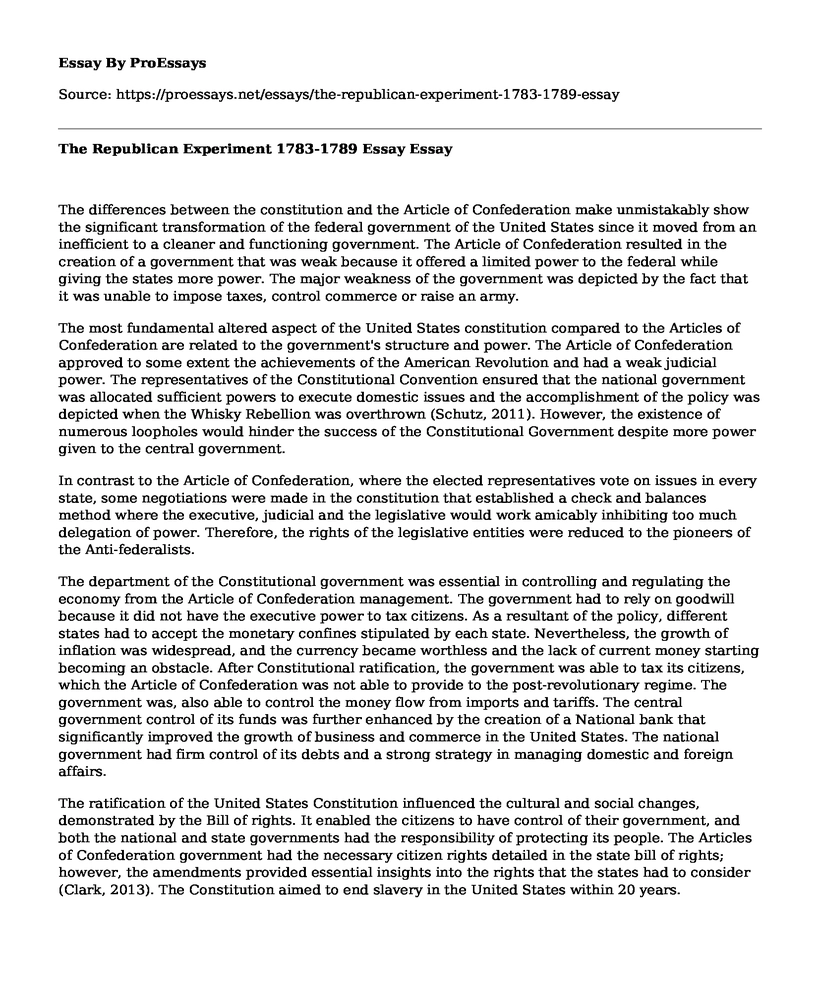The differences between the constitution and the Article of Confederation make unmistakably show the significant transformation of the federal government of the United States since it moved from an inefficient to a cleaner and functioning government. The Article of Confederation resulted in the creation of a government that was weak because it offered a limited power to the federal while giving the states more power. The major weakness of the government was depicted by the fact that it was unable to impose taxes, control commerce or raise an army.
The most fundamental altered aspect of the United States constitution compared to the Articles of Confederation are related to the government's structure and power. The Article of Confederation approved to some extent the achievements of the American Revolution and had a weak judicial power. The representatives of the Constitutional Convention ensured that the national government was allocated sufficient powers to execute domestic issues and the accomplishment of the policy was depicted when the Whisky Rebellion was overthrown (Schutz, 2011). However, the existence of numerous loopholes would hinder the success of the Constitutional Government despite more power given to the central government.
In contrast to the Article of Confederation, where the elected representatives vote on issues in every state, some negotiations were made in the constitution that established a check and balances method where the executive, judicial and the legislative would work amicably inhibiting too much delegation of power. Therefore, the rights of the legislative entities were reduced to the pioneers of the Anti-federalists.
The department of the Constitutional government was essential in controlling and regulating the economy from the Article of Confederation management. The government had to rely on goodwill because it did not have the executive power to tax citizens. As a resultant of the policy, different states had to accept the monetary confines stipulated by each state. Nevertheless, the growth of inflation was widespread, and the currency became worthless and the lack of current money starting becoming an obstacle. After Constitutional ratification, the government was able to tax its citizens, which the Article of Confederation was not able to provide to the post-revolutionary regime. The government was, also able to control the money flow from imports and tariffs. The central government control of its funds was further enhanced by the creation of a National bank that significantly improved the growth of business and commerce in the United States. The national government had firm control of its debts and a strong strategy in managing domestic and foreign affairs.
The ratification of the United States Constitution influenced the cultural and social changes, demonstrated by the Bill of rights. It enabled the citizens to have control of their government, and both the national and state governments had the responsibility of protecting its people. The Articles of Confederation government had the necessary citizen rights detailed in the state bill of rights; however, the amendments provided essential insights into the rights that the states had to consider (Clark, 2013). The Constitution aimed to end slavery in the United States within 20 years.
Conclusion
The government under ratification of the United States Constitution consequently led to significant changes compared to the Article of Confederation. The social, economic and political characteristics were transformed by the ability of the constitution to give more powers to the government. It enabled a government system of checks-and-balances and sheltered citizens from individuals having more powers while the authorities of the government were to enhance business and commerce.
Works Cited
Clark, Joshua. "United States Diplomatic Negotiations Under The Articles Of Confederation." The Eagle Feather (2013): n. pag. Web.
Schutz, Derek. "Influence at the Founding: The Federalist Papers Effect on the Ratification of the Constitution." Constellations, vol. 2, no. 2, July 2011, pp. 125-132., doi:10.29173/cons10500.
Cite this page
The Republican Experiment 1783-1789 Essay. (2022, Sep 11). Retrieved from https://proessays.net/essays/the-republican-experiment-1783-1789-essay
If you are the original author of this essay and no longer wish to have it published on the ProEssays website, please click below to request its removal:
- Essay Sample on Historical Identification
- Role of Law, Policy, and Evidence in Developing a Local Plan - Paper Example
- Essay Sample on President Hoover and the Great Depression
- Essay Sample on the Statue of Nefertiti
- America's Constitution: Debate Over Its Meaning & Significance - Essay Sample
- Essay on Problem-solving & Crime Prevention: Community Policing for Creative Solutions
- National Federal Reserve - Free Essay Sample







